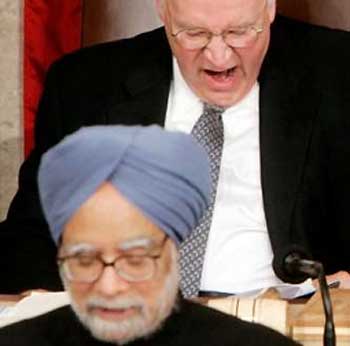|
Concerns voiced over US-India nuclear agreement
(Agencies)
Updated: 2005-07-20 09:40
US President Bush, aiming to boost India as a counterbalance against China's
rise, has moved closer to accepting India as a nuclear weapons state and fueled
fears he is weakening decades-old prohibitions against atomic arms.
Bush accelerated the U.S. embrace of India, after years of estrangement,
during his first term. Monday's decision to permit expansive civilian nuclear
cooperation is a further dramatic development.
Undersecretary of State Nicholas Burns called the agreement "the high-water
mark of U.S.-India relations since 1947." The approach was developed by former
U.S. ambassador to India Robert Blackwill and a close ally, Ashley Tellis, a
South Asia specialist at the Carnegie Endowment for International Peace.
It could, however, provoke a fight with the U.S. Congress, which must amend
U.S. laws, and with America's other nuclear partners, who must tailor
international policies to accommodate Bush's initiative. But Bush's Republican
Party controls Congress and U.S. concerns over China's growing military and
economic might could make support for India irresistible.

U.S. Vice President Dick Cheney (top) yawns
during a speech by India Prime Minister Manmohan Singh (bottom) during a
special Joint Meeting of Congress in the U.S. House of Representatives
chamber on Capitol Hill, July 19, 2005. India upholds nuclear
nonproliferation rules and will never spread sensitive technology, Singh
said on Tuesday, a day after the United States promised to help the South
Asian power develop its civilian atomic sector.
[Reuters] | The agreement goes farther than many
expected. It would remove a ban on civilian nuclear technology sales, allowing
India to obtain nuclear fuel and advanced reactors from U.S. and other
suppliers.
In return, New Delhi would allow international inspections and safeguards on
its civilian nuclear program and refrain from further weapons testing and
transferring arms technology to other countries. Experts agree these are
important advances.
Still, "selling nuclear materials to India is a dangerous proposition and bad
nonproliferation policy," said Democratic Rep. Edward Markey of Massachusetts,
an arms control advocate.
Some experts said the deal sends the wrong signal to Russia and China, major
arms merchants whom Washington has urged not to sell to India, Iran and other
countries, and may prompt other states who surrendered their nuclear ambitions
under the nuclear Nonproliferation Treaty, or NPT, to reconsider.
|
 | | | American women call for end of war | | |  | | | Israeli forces storm Gaza settlement | | |  | | | South Korean, DPRK separated families hold video reunions | | |
|
| |
 |
|
 |
|
|
Today's
Top News |
|
|
|
Top World
News |
 |
|
 |
|
|
|
|
|
|